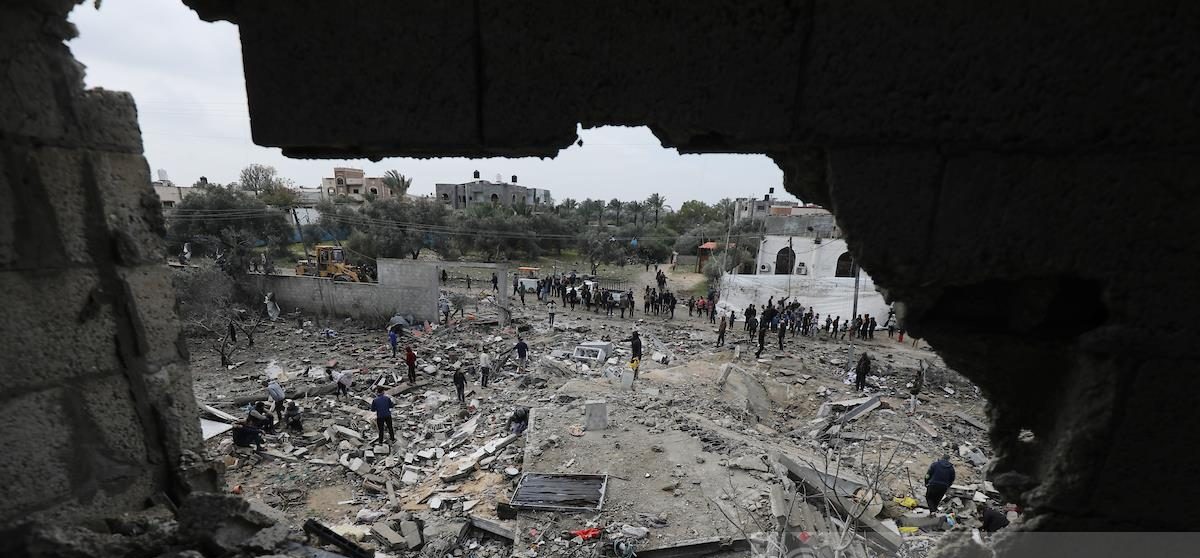The ceasefire talks have been centred around a six-week pause in Gaza that would ultimately pave the way for a ceasefire.
Indirect talks between Israel and Hamas will reportedly resume in Cairo on Sunday in hopes of reaching a truce in Gaza and a captives release deal, Egypt’s Al Qahera News TV reported, citing an Egyptian security source.
The reported resumption of talks comes after Israeli Prime Minister Benjamin Netanyahu’s office confirmed on Friday that he “approved the next round of talks, in the coming days, in Doha and Cairo.”
The statement added that the Israeli delegation will return to the talks “with guidelines for moving forward in the negotiations.”
An Israeli official also confirmed to Reuters that Israel will send its delegation to Egypt on Sunday. A Hamas official told the news agency that they would wait on the mediators’ response regarding the talks with Israel.
The Israeli delegation had left Qatar last week following 10 days of talks as reports pointed to the negotiations reaching a “dead-end.”
However, Qatar’s Foreign Ministry spokesperson Majed Al Ansari said at the time that the talks were ongoing, noting that the entry and exit of delegations are normal.
Talks have stalled for months after the expiration of a week-long truce, mediated by Qatar and Egypt, on December 1, 2023. The truce enabled the release of at least 110 Israeli and foreign captives from Gaza.
The deal led to the release of 242 Palestinian women and children from Israeli prisons, though Israel re-arrested at least 11 of those who were released since the beginning of the year.
Israel has since intensified its genocidal war on Gaza, which has now killed 32,705 Palestinians while placing the 2.2 million population under a worsening humanitarian catastrophe.
Israel killed 82 Palestinians in Gaza within the past 24 hours, Palestine’s news agency (Wafa) reported on Saturday.
The ceasefire talks have been centred around a six-week pause in Gaza that would ultimately pave the way for a ceasefire.
A sticking point in the negotiations has been the demand for a complete ceasefire by Hamas, which Israel repeatedly rejected as it continued its relentless war on Gaza.
Israel also shrugged off last week’s United Nations Security Council vote for a ceasefire resolution.
The UNSC adopted the resolution following a majority vote of 14 members as the United States abstained, a move that angered its ally, Israel. Washington had vetoed three past resolutions, echoing Tel Aviv’s refusal to end the war.
Netanyahu has been facing mounting pressure to return the remaining captives and agree to a deal, with protests seen across occupied territories on Saturday. Some protesters headed to Netanyahu’s residence calling for his resignation.
Protesters have described Netanyahu as an “obstacle to a deal” to the release of captives from Hamas. Around 130 captives are believed to be still in Gaza, though not all of them are alive as the non-stop Israeli attacks have killed some.
Netanyahu has been insisting on advancing into Rafah, where more than one million Palestinians have been sheltering since the beginning of the war. Israel had initially declared the south to be a safer zone when it forced Palestinians to flee the north.
Israeli occupation forces targeted the entirety of the Gaza Strip with people being forced to flee more than once, displacing more than 80 percent of the population.
More people have been forced to flee since last week from Gaza City under Israel’s attacks on the Al-Shifa Medical Complex.
At least 107 patients are still trapped in the hospital, the largest in Gaza, as a result of the occupation forces’ siege of the facility that has entered its second week, according to Wafa.
Those trapped inside have no access to water, electricity, food, and medicine, with 30 patients in critical condition. The Israeli military has also blocked all attempts to evacuate the area.
Protests in Jordan, Egypt and Morocco took place over the weekend, demanding a complete ceasefire in Gaza as some called for the severance of ties with Israel.







